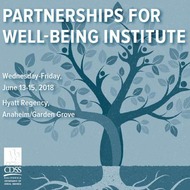A1 Using Trauma-Informed Principles to Infuse Self-Care in Schools
(View Complete Item Description)As the healthcare system evolves to meet the changing demands of an increasingly diverse nation; creating an equally prepared system of services that address these needs has become a top priority for all service providers. Dr. Isaiah Pickens will discuss the challenges for families of navigating within and across systems and the promise of integrating a relationship-based framework to meet their needs; while providing evidence-based care. This keynote address will inspire service providers to use relationships for building resilience in both their clients and themselves.
Material Type: Lecture Notes




















